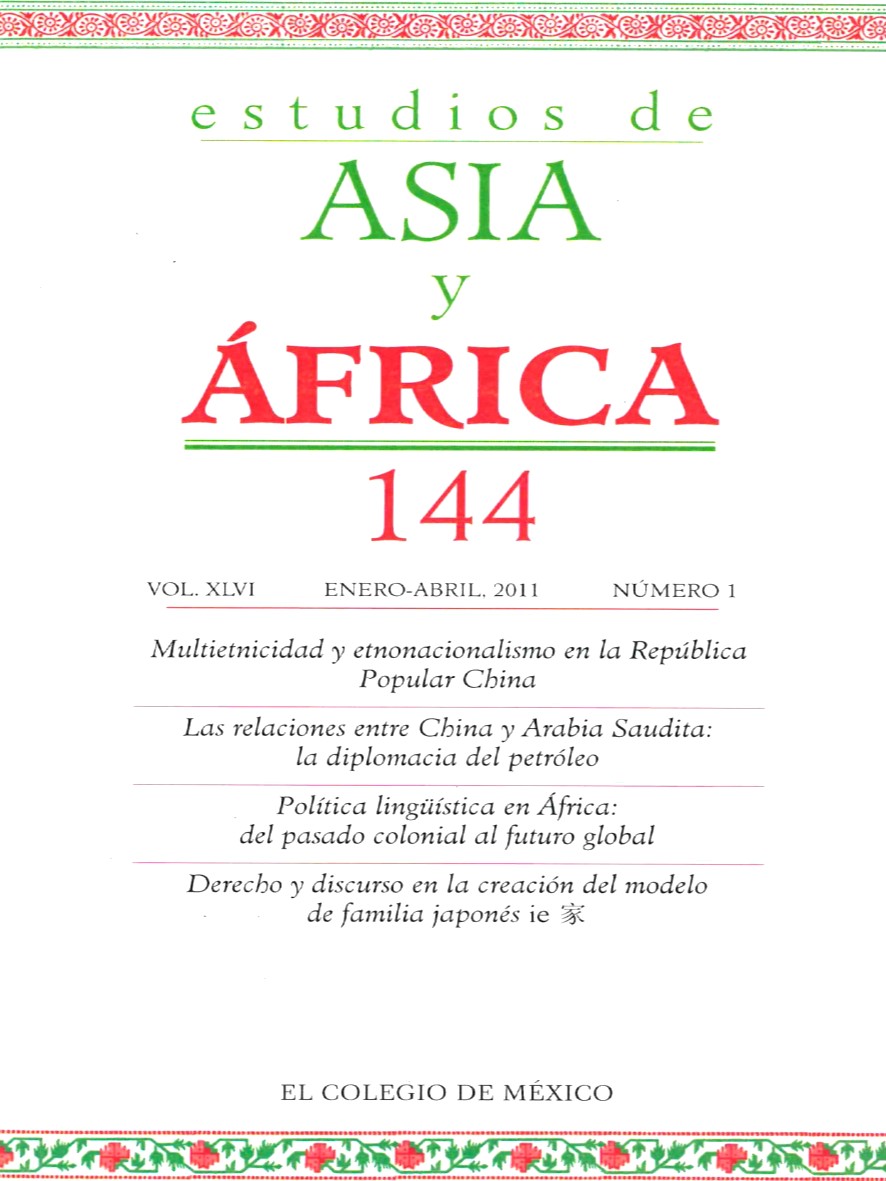Resumen
Este artículo trata sobre la construcción del modelo de familia tradicional en japón durante el periodo Meiji. Asimismo, hace una deconstrucción del concepto de ie, conforme al lenguaje jurídico del Código Civil japonés de 1889 (Código Civil Meiji), para establecer su naturaleza secundaria y subordinada a la familia tradicional, como tradición inventada por los ideólogos oficiales. Por último, sostiene la importancia de los dos niveles del discurso, el político y el jurídico, en la consolidación del estado Meiji.Referencias
Akamatsu, Paul, Meiji-1868: Revolución y contrarrevolución en Japón, Madrid, Siglo XXI, 1977.
Beardsley, R., J. Hall y R. Ward, Village Japan, Chicago, Chicago University Press, 1959.
Beasley, W. G., The Meiji Restoration, Stanford, Stanford University Press, 1972.
Befu, Harumi, “Corporate emphasis and patterns of descent in the Japanese family”, Japanese Culture: Its Development and Characteristics, Londres, Routledge, 2004.
____________, The Group Model of Japanese Society and an Alternative, Texas, Rice University, 1980.
De Becker, J. E., The Principles and Practice of the Civil Code of Japan, vol. 1, Londres, Buttersworth & Co., 1921.
Frank, Ronald, “Civil code, general provisions”, en Wilhelm Röhl (ed.), History of Law in Japan since 1868, Leiden-Boston, Brill, 2005.
Fridell, Willbur M., “Government ethics textbooks in Late Meiji Japan”, The Journal of Asian Studies, vol. 29, núm. 4, 1970.
Fukutake Tadashi, The Japanese Social Structure, Tokio, University of Tokyo Press, 1982.
Haley, John, Authority without Power, Nueva York, Oxford University Press, 1991.
Hendry, Joy, Understanding Japanese Society, Nueva York, Routledge, 1996, y Londres, Routledge, 1989.
Hobsbawm, Eric y Terence Ranger, La invención de la tradición, Barcelona, Crítica, 2002.
Inoue Mitsusada, “The Ritsuryo system in Japan”, Acta Asiática, vol. 31, 1977.
Ishμ Ryosuke, Japanese Legislation in the Meiji Era, trad. William J. Chambliss, Tokio, Pan-Pacific Press, 1958.
Itō, Ken K., “The family and the nation in Tokutomi Roka’s Ho¬totogisu”, Harvard Journal of Asiatic Studies, vol. 60, núm. 2, diciembre, 2000.
Kaibara Yukio, Historia de Japón, México, FCE, 2000.
Kazuhiro Taki, The Meiji Constitution: The Japanese Experience of the West and the shaping of the Modern State, Tokio, International House of Japan, 2007.
Kreiner, Josef (ed.), The Impact of Traditional Thought on Present-day Japan, Munich, Editorial Iudicium, 1996.
Margadant, Guillermo F., Evolución del derecho japonés, México, Miguel Ángel Porrúa, 1984.
____________, El Derecho japonés actual, México, FCE, 1993.
Menander Dawson, Miles, The Ethics of Confucius, Londres, Knic¬kerbocker Press, 1915.
Ming-Cheng M. Lo y Christopher P. Bettinger, “The historical emergence of a ‘familial society’ in Japan”, Theory and Society, vol. 30, núm. 2, abril, 2001.
Mizubayashi Takeshi, 明治国家のいえ (Meiji kokka no ie, “La ‘familia’ en el Estado Meiji”), Historia de Japón, vol. 2, Iwanami Shoten, Tokio, 1987.
Murakami Kazuhiro, 明治離婚裁判史論 (Meiji rikon saiban shiron, Teoría sobre las sentencias de divorcio en Meiji), Kioto, Hōritsu Bunkasha, 1994.
Murakami Yasusuke, “Ie society as a pattern of civilization”, The Journal of Japanese Studies, vol. 10. núm. 1, 1984.
Nakamura Kichisaburo, The Formation of Modern Japan as viewed from Legal History, Tokio, The Centre for East Asian Cultural Studies, 1962.
Nakane Chie, Japanese Society, Berkeley, University of California Press, 1970.
Nobushigue Hozumi, Ancestor-Worship and Japanese Law, Hogaku-Hakushi, Maruzen Kabushiki-Kaisha, 1912.
____________, Lectures on the New Japanese Civil Code as Material for the Study of Comparative Jurisprudence, Tokio, Maruzen Kabushiki-Kaisha, 1912.
Röhl, Wilhelm, History of Law in Japan since 1868, Leiden, Brill, 2005.
Reischauer, Edwin O., The Japanese, Cambridge-Massachussets-Lon¬dres, The Belknap Press of Harvard University Press, 1977.
Satō Tadao, For the Re-birth of the Home: Theorizing Soap Operas, Tokio, Horonsha Press, 1978.
Steenstrup, Carl, A History of Law in Japan until 1868, Leiden, E. J. Brill, 1996.
Sugiyama Takie, Japanese Patterns of Behavior, Hawai, University of Hawaii Press, 1976.
Takabatake Michitoshi et al., Política y pensamiento político en Japón 1868-1925, México, El Colegio de México, 1992.
Takayanagi Kenzo, “A century of innovation: The development of Japanese law, 1868-1961”, en Arthur Taylor von Mehren (ed.), Law in Japan: The Legal Order in a Changing Society, Cambridge, Harvard University Press, 1963.
Ueno Chizuko, The Modern Family in Japan: Its Rise and Fall, Mel¬bourne, Trans Pacific Press, 2008.
Uno Fumishige, “Los legisladores del CCM y el concepto de ie”, Hosei Kenkyu, vol. 74, núm. 3, diciembre, 2007.
Villaseñor Rodríguez, Fernando, “La importancia del modelo occidental de derecho en la creación del Estado Japonés”, Bo¬letín Mexicano de Derecho Comparado, año XLII, núm. 127, enero-abril, 2010.
Von Mehren, Arthur Taylor (ed.), Law in Japan: The Legal Order in a Changing Society, Cambridge, Harvard University Press, 1963.
Yanagita Kunio, About our ancestors: The Japanese Family System, Ministry of Education, Tokio, 1970.
Yasu Iwasaki, “Divorce in Japan”, The American Journal of Sociology, vol. 36, núm. 3, noviembre, 1930.
Yoshiyuki Noda, Introduction to Japanese Law, Tokio, University of Tokyo Press, 1976.
Esta obra está bajo una licencia internacional Creative Commons Atribución-NoComercial-SinDerivadas 4.0.
Derechos de autor 2022 Estudios de Asia y África


